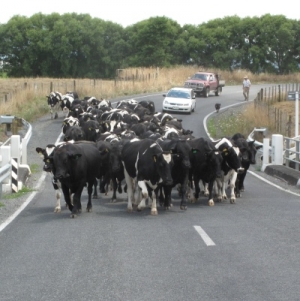THE NEW Zealand Transport Agency is reminding Canterbury rural property owners of their responsibility to adequately fence their properties to contain livestock after a significant rise in reports of wandering stock.
There have been 36 reports of wandering stock since December 24, which the Transport Agency's journey manager Lee Wright says poses a serious safety risk to all road users, not only on the state highway network, but also on local roads.
The highest number of wandering stock reports have been on State Highway 1 in North Canterbury and State Highway 75, in particular from Little River to Akaroa.
"When farm animals are wandering on highways, they present a significant hazard for anyone travelling through the area and there is the potential for serious injury, and even fatal, crashes to happen as a result.
"The Transport Agency is reminding rural property owners that they are liable for any damage caused by their wandering stock and if wandering stock cause a crash and negligence is proven, the livestock owner may be prosecuted."
Wright says property and livestock owners need to be aware they have responsibilities under three pieces of legislation – the Crimes Act 1961, the Animal Law reform Act 1989 and the Impounding Act 1955.
"It is important property and livestock owners are aware of their responsibilities under the acts and take relevant measures to ensure their farm animals remain adequately fenced in."
Motorists are asked to report any wandering stock by phoning 0800 4 HIGHWAYS.



















